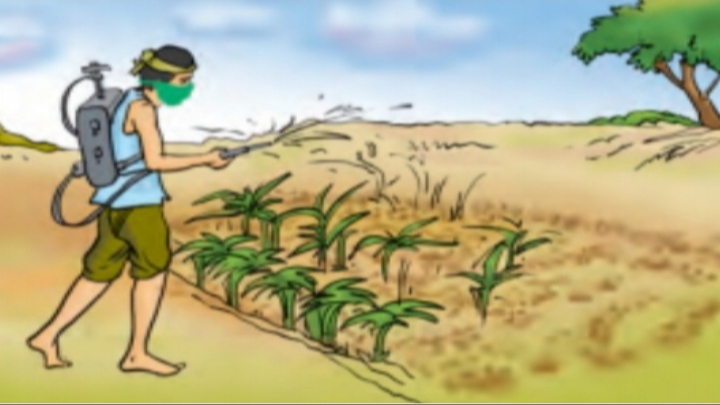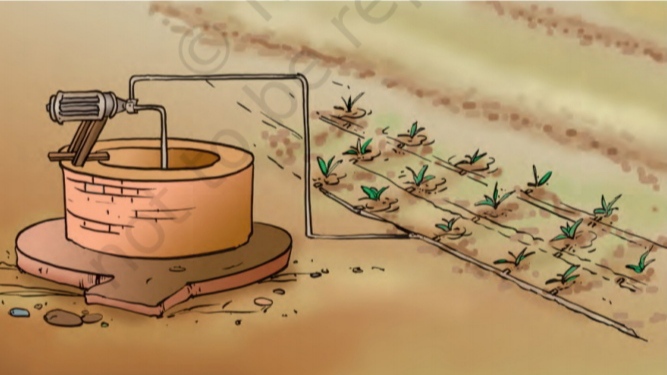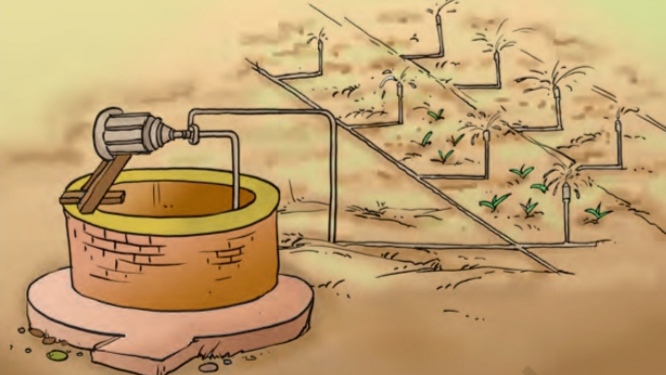Crop Production and Management class 8 Science NCERT Solutions
Crop Production and Management class 8 Science NCERT Solutions: Crop Production and Management is the chapter 1 from class 8 Science NCERT. Here you'll get Crop Production and Management class 8 Science/Crop Production and Management class 8 Science NCERT Solutions.
Crop Production and Management class 8 Science Main Points
In order to provide food to our growing population, we need to adopt certain agricultural practices. Same kind of plants cultivated at a place constitute a crop.
In India, crops can be broadly categorised into two types based on seasons - rabi and kharif crops. It is necessary to prepare soil by tilling and levelling. Ploughs and levellers are used for this purpose.
Sowing of seeds at appropriate depths and distances gives good yield. Good variety of seeds are sown after selection of healthy seeds. Sowing is done by seed drills.
Soil needs replenishment and enrichment through the use of organic manure and fertilisers. Use of chemical fertilisers has increased tremendously with the introduction of new crop varieties.
Supply of water to crops at appropriate intervals is called irrigation. Weeding involves removal of unwanted and uncultivated plants called weeds.
Harvesting is the cutting of the mature crop manually or by machines. Separation of the grains from the chaff is called threshing.
Proper storage of grains is necessary to protect them from pests and microorganisms. Food is also obtained from animals for which animals are reared. This is called animal husbandry.
Crop Production and Management class 8 Science Notes
Plants of the same kind that are grown and cultivated as a source of food in a large cultivable land is called a crop. In our country, crops are classified on the basis of the season in which they grow.
The crops which are sown in the rainy season and harvested in September to October are called kharif crops. The crops which are grown in the winter season and harvested in March to April are called rabi crops.
The crops which are grown in the summer season and harvested before rainy season are called summer crops or zayed crops e.g. Moong and muskmelon.
The activities undertaken by farmers over a period of time for cultivation of crops are known as agricultural practices. Soil is prepared by tilling. A plough is used for tilling of soil.
Now a days ploughing is done by tractor having a multi-pronged plough. A ploughed field may have big pieces of soil called crumbs, the crumbs are broken with the help of a plank.
Loose soil be levelled for sowing and irrigation. Levelling of soil is done with the help of a leveller. After than sowing of seeds is done in the soil. Sowing is the process of putting seeds in the soil.
Quality of the seed is an important factor that determines the crop yield. Selection of good seeds is done by putting the seeds in water. The dead and damaged seeds become hollow and float on water whereas the good seeds sink. The good quality seeds means clean and healthy seeds of a good variety free from diseases.
To get good harvest we should remove weeds. Weeds compete with the crop plants for water, nutrients, space and light and thus affect the growth of the crop. So, they should be removed.
The substances which are added to the soil in the form of nutrients for the healthy growth of plants are called manure and fertilisers. Manure obtained from animal or plant waste such as cattle dung, droppings is called organic manure. Fertiliser is a man-made Manure is a natural substance obtained inorganic salt.
A seed drill is used for sowing seeds. It has a funnel shaped opening leading to long tubes attached to a plough. Seeds are put into the funnel. As the plough makes furrows in the soil, the seeds are deposited in the soil by the drill.
Class 8 Science Chapter 1 Crop Production and Management Questions Answers
1. Select the correct word from the following list and fill in the blanks.
float, water, crop, nutrients, preparation
(a) The same kind of plants grown and cultivated on a large scale at a place is called _____________.
(b) The first step before growing crops is _____________ of the soil.
(c) Damaged seeds would _____________ on top of water.
(d) For growing a crop, sufficient sunlight and _____________ and_____________ from the soil are essential.
Ans:
(a) The same kind of plants grown and cultivated on a large scale at a place is called crop.
(b) The first step before growing crops is preparation of the soil.
(c) Damaged seeds would float on top of water.
(d) For growing a crop, sufficient sunlight and water and nutrients from the soil are essential.
2. Match items in column A with those in column B.
A B
(i) Kharif crops (a) Food for cattle
(ii) Rabi crops (b) Urea and super phosphate
(iii) Chemical fertilisers (c) Animal excreta, cow dung
urine and plant waste
(iv) Organic manure (d) Wheat, gram, pea
(e) Paddy and maize
Ans: A B
(i) Kharif crops (e) Paddy and maize
(ii) Rabi crops (d) Wheat, gram, pea
(iii) Chemical fertilisers (b) Urea and super phosphate
(iv) Organic manure (c) Animal excreta, cow dung urine and plant waste
3. Give two examples of each.
(a) Kharif crop
(b) Rabi crop
Ans: (a) Kharif crop: Paddy and maize
(b) Rabi crop: Wheat and gram
NCERT Solutions of Crop Production and Management class 8 Science
4. Write a paragraph in your own words on each of the following.
(a) Preparation of soil (b) Sowing
(c) Weeding (d) Threshing
Ans:
(a) Preparation of soil: Soil preparation is necessary before growing a crop. It involves tilling and loosening the soil. This allows the roots to penetrate deep in the soil and to breath easily even when they are deep.
(b) Sowing: The process of putting seeds into the soil is called sowing. The tool used traditionally for sowing seeds is funnel-shaped. Nowadays a seed drill is used for sowing with the help of tractors. This tool sows the seed uniformly at a proper distance and depth.
(c) Weeding: Some undesirable plants grow along with crop and these unwanted plants are called weeds. The process of removing these unwanted plants is called weeding.
(d) Threshing: The process of separating the grain seeds from the chaff is called threshing.
5. Explain how fertilisers are different from manure.
Ans:
Fertilisers:
(i) A fertiliser is an inorganic salt.
(ii) A fertiliser is prepared in factories.
(iii) A fertiliser does not provide any humus to the soil.
(iv) Fertilisers are very rich in plant nutrients like nitrogen, phosphorus and potassium.
Manures:
(i) Manure is a natural substance obtained by the decomposition of cattle dung, human waste and plant residues.
(ii) Manure can be prepared in the fields.
(iii) Manure provides a lot of humus to the soil.
(iv) Manure is relatively less rich in plant nutrients.
6. What is irrigation ? Describe two methods of irrigation which conserve water.
Ans: The supply of water to crops at regular intervals is called irrigation. Methods of irrigation which conserve water are;
(i) Drip Irrigation system: Here the water goes drop by drop directly into the roots this method is very useful as it conserves the water and also helps in avoiding weeds.
(ii) Sprinkler Irrigation system: This method is in use in mainly uneven land where sufficient water is not available. This irrigation system has an arrangement of pipes or tubes with very small holes in them to water plants drop by drop just at the base of the root. It is very efficient as water is not wasted at all.
NCERT Solutions for Crop Production and Management class 8 Science
7. If wheat is sown in the kharif season, what would happen ? Discuss.
Ans: If wheat is sown in the kharif season, it may get destroyed. Wheat is Rabi Crop and is sown in the winter season during October to March and it needs very less water. Due to unfavourable weather it gets destroyed.
8. Explain how soil gets affected by the continuous plantation of crops in a field.
Ans: Continuous plantation of crops makes the soil poorer in certain nutrients as the crops take up nutrients from the soil. The soil becomes infertile. Plants require nutrients for their growth. Without optimum nutrients plants will die. It does not get enough time to replenish the nutrients.
9. What are weeds ? How can we control them ?
Ans: Undesirable plants that grow naturally along with the crop are known as weeds. It can be controlled by the process of weeding. Weeding involves the removal of unwanted and uncultivated plants called weeds. Weeding is essential as weeds compete with the crop plants for water, nutrients, space and light. It affects the growth of the crop. Some weeds are even poisonous for animals and human beings.
Also Read;












No comments:
Post a Comment
Kindly donnot paste any SPAM link. Thank you very much for reading, Happy learning.